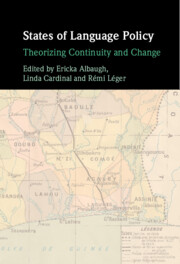Refine search
Actions for selected content:
4 results
1 - Introduction
- from Introduction
-
-
- Book:
- States of Language Policy
- Published online:
- 14 November 2024
- Print publication:
- 21 November 2024, pp 3-26
-
- Chapter
- Export citation

States of Language Policy
- Theorizing Continuity and Change
-
- Published online:
- 14 November 2024
- Print publication:
- 21 November 2024
1 - The Liberal Tradition in America
- from Part I - Theoretical Orientations
-
-
- Book:
- Language Politics and Policies
- Published online:
- 18 July 2019
- Print publication:
- 18 July 2019, pp 27-44
-
- Chapter
- Export citation
Part I - Theoretical Orientations
-
- Book:
- Language Politics and Policies
- Published online:
- 18 July 2019
- Print publication:
- 18 July 2019, pp 25-94
-
- Chapter
- Export citation
